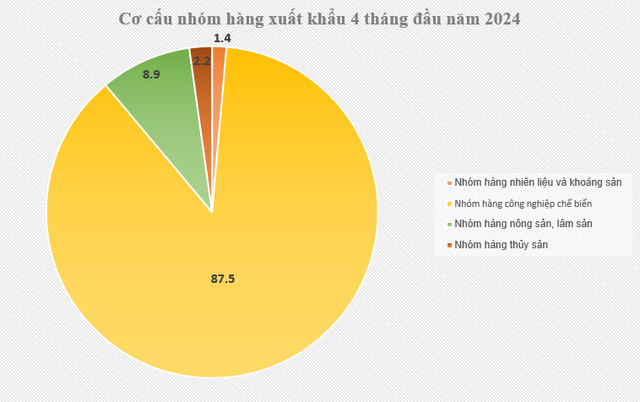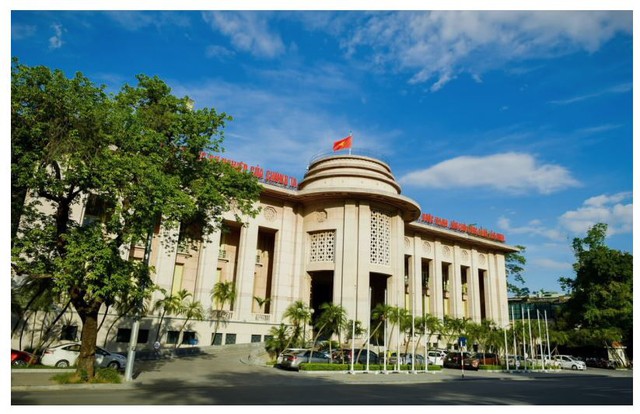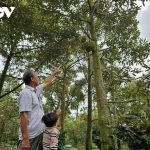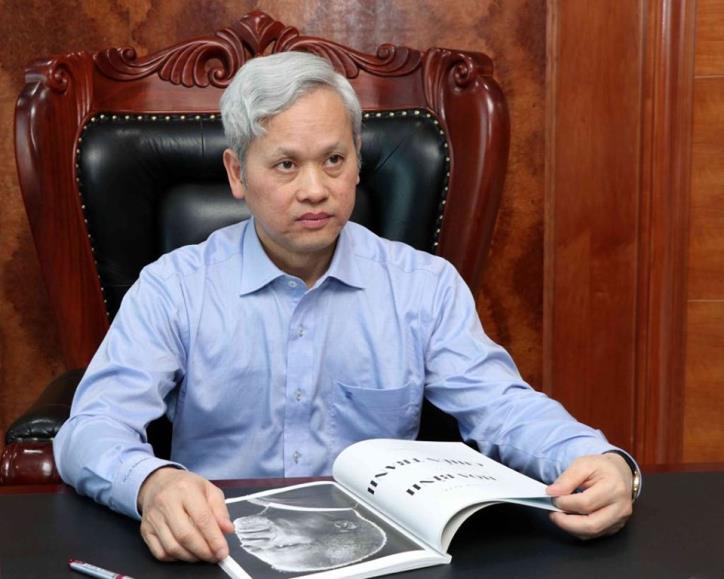
Nguyen Bich Lam, an economic expert and former director general of the General Statistics Office. Photo: Thuy Hien / TTXVN
This year will be the time for foreign investors to seize opportunities and implement high-tech foreign direct investment (FDI) projects in Vietnam. To further understand the bright spots in attracting FDI and the solutions to enhance the capacity and driving force for economic growth in the coming time, Vietnam News Agency reporters had an exchange with Mr. Nguyen Bich Lam, former director general of the General Statistics Office, on this matter.
From the beginning of the year until now, FDI inflows into Vietnam have been quite large. How do you assess this impact?
In the first two months of the year, registered FDI reached USD 4.29 billion, up 38.6%, a significant increase compared to the same period last year. The disbursed FDI capital also showed positive growth, reaching USD 2.8 billion, up 9.8%, indicating that foreign investors are fulfilling their commitments in the Vietnamese market. This reflects the absorptive capacity and disbursement of investment capital of our economy.
In my opinion, a notable point about FDI in Vietnam in recent times is the high number of new projects and newly registered capital. This is a good sign, and we expect this newly registered capital to be disbursed soon, driving growth in 2024 and the following years.
Despite the world economy being divided and multinational corporations being cautious in making investment decisions, FDI inflows into Vietnam are still growing. What has helped Vietnam attract such a large amount of investment capital?
In an uncertain and unpredictable global economy with fierce strategic competition, the world economy is divided, leading to a reduction in international capital flows. Vietnam remains an attractive market for foreign investors and the most favorable investment destination in the coming time due to the strengths of our economy.
Firstly, our economy has recovered and developed stably, with inflation being controlled below the target level. According to PwC’s study “World in 2050,” Vietnam will achieve the second highest annual GDP growth rate in the world and GDP will increase by an average of 5.3% per year during the 36-year period from 2014 to 2050. This important macroeconomic indicator is evidence of the success of the government’s management in recovering and maintaining the stability of the economy.
In addition, Vietnam has a dynamic economy and an expanding consumer market with abundant supply; maintaining macroeconomic stability. The business environment is considered the most open and friendly by foreign investors. Business and investment barriers have been removed, creating a favorable, transparent, and full of opportunities environment for foreign investors.
Foreign investors highly appreciate Vietnam’s affirmation and integration with the world’s green development trend through strong and urgent commitments in implementing COP 26 regulations. In addition, the government has issued many policies to encourage foreign investors to invest in projects using advanced technology, clean technology, and environmentally friendly methods, with modern management practices and positive contributions to global production and supply chains.
Most importantly, Vietnam has deep and wide integration into the regional and global areas. Vietnam has also signed and implemented many free trade agreements with more than 60 partners around the world. In terms of market access liberalization, according to the World Trade Organization (WTO), Vietnam is on par with Singapore – the most developed country in Southeast Asia. In addition, Vietnam has relaxed foreign ownership regulations in listed companies, reducing the burden on investors. Since 2015, the government has allowed foreign ownership in listed companies to be up to 100% in certain cases and has allowed foreign investors to invest without limitations in government bonds.
Furthermore, Vietnam has a favorable geographical location, serving as a gateway for international goods trading by sea. The increasingly synchronized infrastructure and technology are also attractive advantages for foreign investors coming to Vietnam.
With the achievements and practical results in attracting FDI, will 2024 be a breakthrough year in attracting FDI, sir?
In an uncertain and unpredictable global economy, national interests and security are fully shaping all global economic policies. In discussions on the use of capital, multinational companies are focusing more on the issue of transferring capital back to their countries or close to their countries.
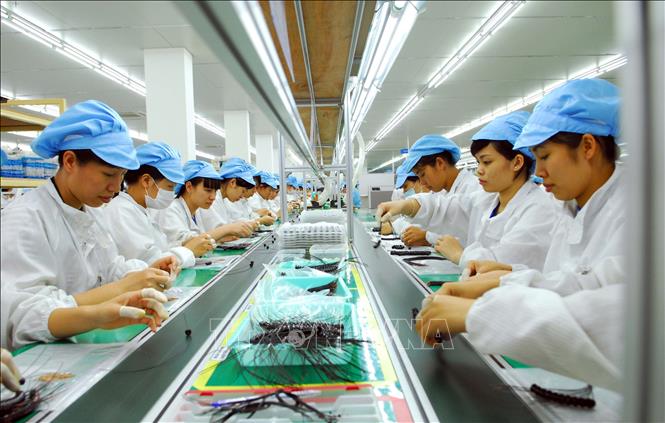
The electronics manufacturing line at the Bluecom Vina Co., Ltd., a 100% Korean-invested company, in Trang Due Industrial Park (Hai Phong). Until now, South Korea has invested in 7,389 projects with a total capital of over USD 62 billion, ranking first among countries and territories investing in Vietnam. Photo: Danh Lam / TTXVN
With an independent, self-reliant, diversified, and multilateral foreign policy, Vietnam is a reliable partner and a responsible member of the international community; with flexible and appropriate diplomatic policies. Vietnam is a comprehensive strategic partner or strategic partner with all 5 permanent members of the United Nations Security Council.
On 7th March 2024, Australia became the 7th Comprehensive Strategic Partner of Vietnam. Vietnam’s position has been elevated, becoming a political, economic, and security center in the region. Vietnam has become a friendly country in the international business and political community, a connecting economy in the divided world. This is an advantage that only a few countries have.
Upgrading the comprehensive strategic partnership with the United States and Japan, focusing on trade and investment cooperation, science and technology, is an important precondition for economic development. In particular, for foreign investment in high-tech and export, this is an opportunity to make a breakthrough in attracting FDI in 2024 and the following years.
With an increasingly consolidated role, the economic growth of Vietnam is expected to recover more positively this year amid a stable social and political platform. The credit rating agency Fitch Ratings recently upgraded Vietnam’s sovereign credit rating to BB+ with a stable outlook.
With the current capacity of domestic enterprises, the government and localities also play a crucial role in supporting enterprises to participate in the global supply chain and value chain. In the initial stage, the government and localities play the roles of “midwife, nurturer, and reliable companion” of enterprises in training, meeting the needs of skilled and qualified labor. At the same time, enhancing the management capacity of enterprises, supporting them in terms of capital and absorbing advanced technology.
The global flow of FDI witnessed a change starting from 2024 when countries implemented regulations on a global minimum tax. What should Vietnam do to continue attracting this source of capital?
To continue attracting FDI in the context of implementing a global minimum tax, it is necessary to adjust investment attraction strategies and policies by: eliminating preferential corporate income tax by enhancing the competitiveness of the investment and business environment, developing infrastructure, training skilled labor with competitive salaries in the region and the world.
In addition, the Ministry of Planning and Investment urgently studies and adjusts strategies and policies to attract foreign investment in Vietnam; applies investment incentives equally to all enterprises in the new context, which are suitable for the global minimum tax.
Instead of preferential treatment regarding corporate income tax that no longer carries value, the government is studying and has solutions to appropriately support investment costs, labor training, research and development costs, and housing construction for workers; supporting green growth and environmental protection for existing and future FDI enterprises in Vietnam.
Furthermore, urgently enhancing the capacity of synchronized transportation, industrial, technology, information, and logistics infrastructure; completing clear, open, transparent, and concise regulations and procedures related to land use rights; firefighting and fire prevention. In addition, there should be mechanisms to encourage FDI projects to use environmentally friendly technologies, self-produce and use renewable energy.
Thank you, sir!









